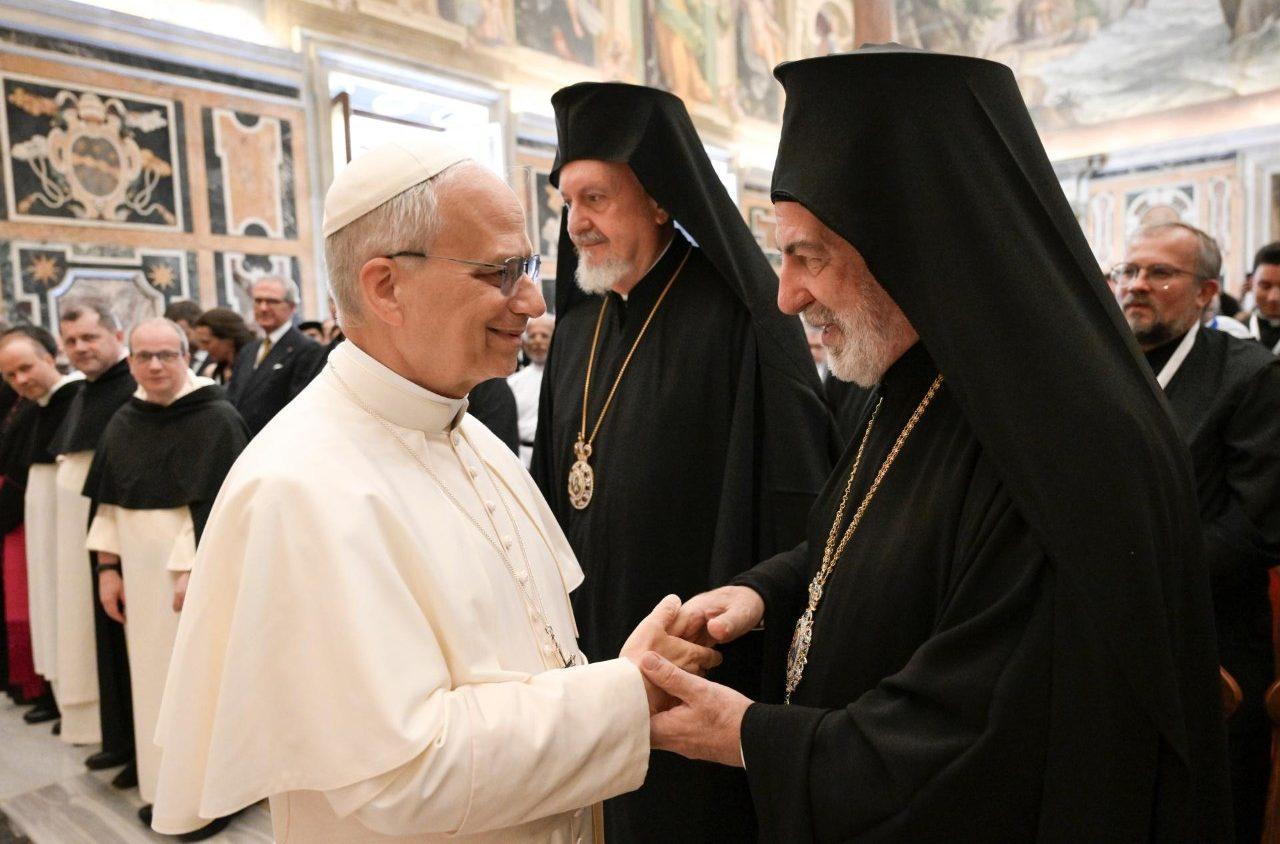Christian unity will not be “primarily the fruit of our own efforts, nor will it be realized through any preconceived model or blueprint,” according to Pope Leo XIV.
Speaking on Saturday to members the Symposium “Nicaea and the Church of the Third Millennium: Towards Catholic-Orthodox Unity” – jointly organized by Œcumenicum, the Institute for Ecumenical Studies of the Angelicum, and the International Orthodox Theological Association – the pontiff said unity will be a gift received as Christ wills and by the working of the Holy Spirit.
The four-day ecumenical conference was held to mark the 1700th anniversary the First Council of Nicaea, the first of the 21 ecumenical councils recognized by the Catholic Church.
At the beginning of the conference, Cardinal Kurt Koch – the prefect of the Dicastery for Promoting Christian Unity – said the First Council of Nicaea was important for ecumenism.
“The restoration of the unity of the Church requires agreement on the essential content of the Christian faith, not only among the Churches and ecclesial communities of today, but also in continuity with the Church of tradition, and above all, with its apostolic origins,” the cardinal said.
“The Council of Nicaea took place at a time when Christianity had not yet been divided by so many subsequent schisms; its creed is therefore shared by all Christian Churches and ecclesial communities, uniting them in a common confession to this day. Its ecumenical importance cannot be underestimated,” Koch said at the opening of the conference.
The first Ecumenical Council took place in 325, and went against the Arian heresy, which denied the true divinity of Jesus Christ.
This is why the Nicene Creed is read every Sunday at Mass – saying Jesus is “God from God, light from light, true God from true God, begotten not made, consubstantial with the Father.”
On Saturday, Pope Leo told participants the Council of Nicaea “is not merely an event of the past, but a compass that must continue to guide us towards the full visible unity of all Christians.”
“The First Ecumenical Council is foundational for the common journey that Catholics and Orthodox have undertaken together since the Second Vatican Council. For the Eastern Churches, which commemorate its celebration in their liturgical calendar, the Council of Nicaea is not simply one Council among others or the first in a series, but the Council par excellence, which promulgated the norm of the Christian faith, the confession of faith of the 318 Fathers [the bishops attending the council],” he said.
“I am convinced that by returning to the Council of Nicaea and drawing together from this common source, we will be able to see in a different light the points that still separate us,” Leo said.
“Through theological dialogue and with God’s help, we will gain a better understanding of the mystery that unites us. By celebrating together this Nicene faith and by proclaiming it together, we will also advance towards the restoration of full communion among us,” the pope added.
Pope Leo noted the Council of Nicaea “inaugurated a synodal path for the Church to follow” when dealing with theological and canonical questions at the universal level.
“The contribution of fraternal delegates from the Churches and ecclesial communities of East and West to the recent Synod on Synodality held here in the Vatican was a valuable stimulus to greater reflection on the nature and practice of synodality,” he said.
The pontiff also mentioned efforts to find a unified date for the celebration of Easter between the Western and Eastern Churches.
“Sadly, differences in their calendars no longer allow Christians to celebrate together the most important feast of the liturgical year, causing pastoral problems within communities, dividing families and weakening the credibility of our witness to the Gospel,” Leo said.
“In this year, when all Christians have celebrated Easter on the same day, I would reaffirm the openness of the Catholic Church to the pursuit of an ecumenical solution favoring a common celebration of the Lord’s resurrection and thus giving greater missionary force to our preaching of the name of Jesus and the salvation born of faith in the saving truth of the Gospel,” he said.
Last month, Pope Leo met with Ecumenical Patriarchate Bartholomew I and agreed to meet together in Nicaea – located in what is now Turkey – toward the end of November, near the Feast of Saint Andrew.
Follow Charles Collins on X: @CharlesinRome












